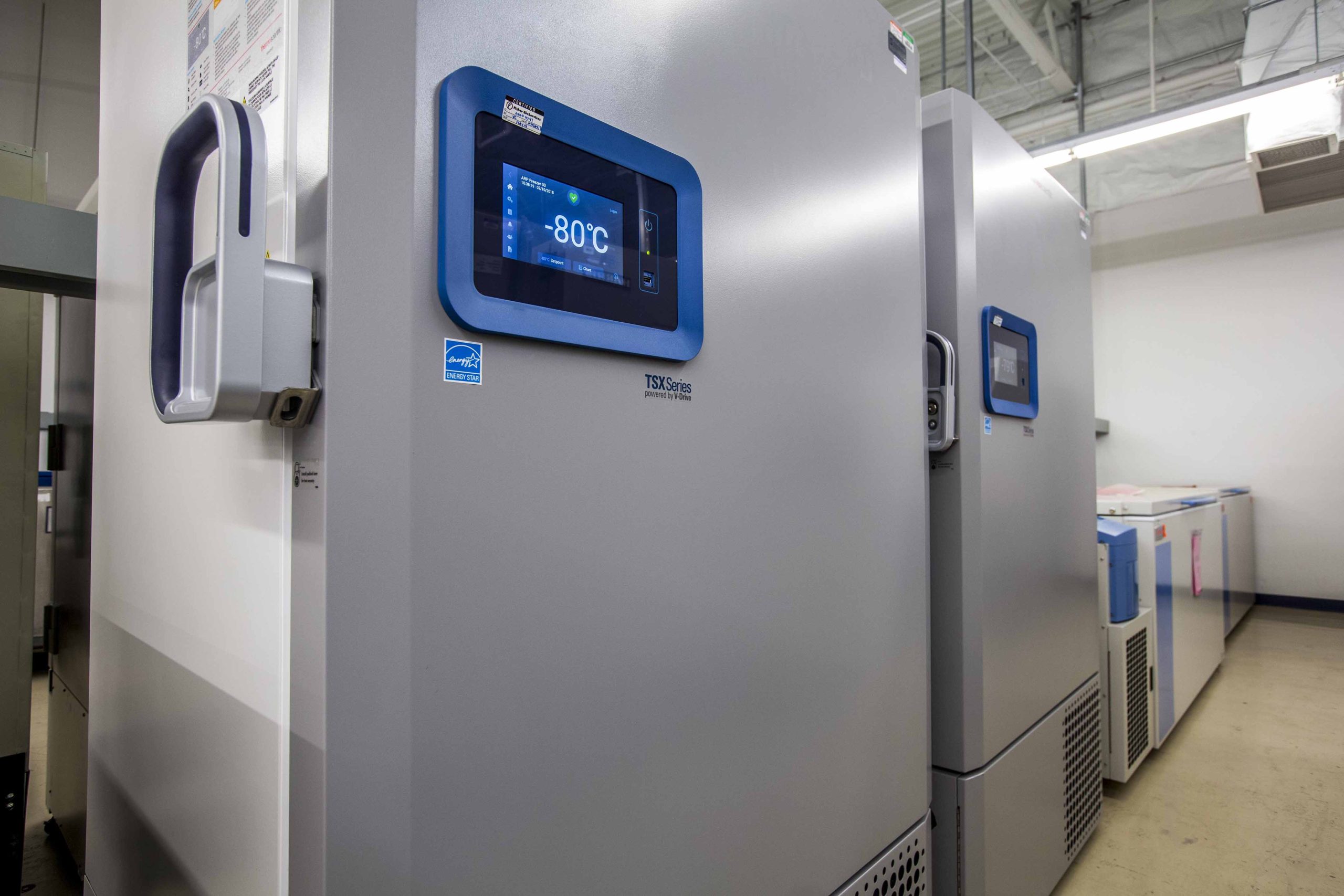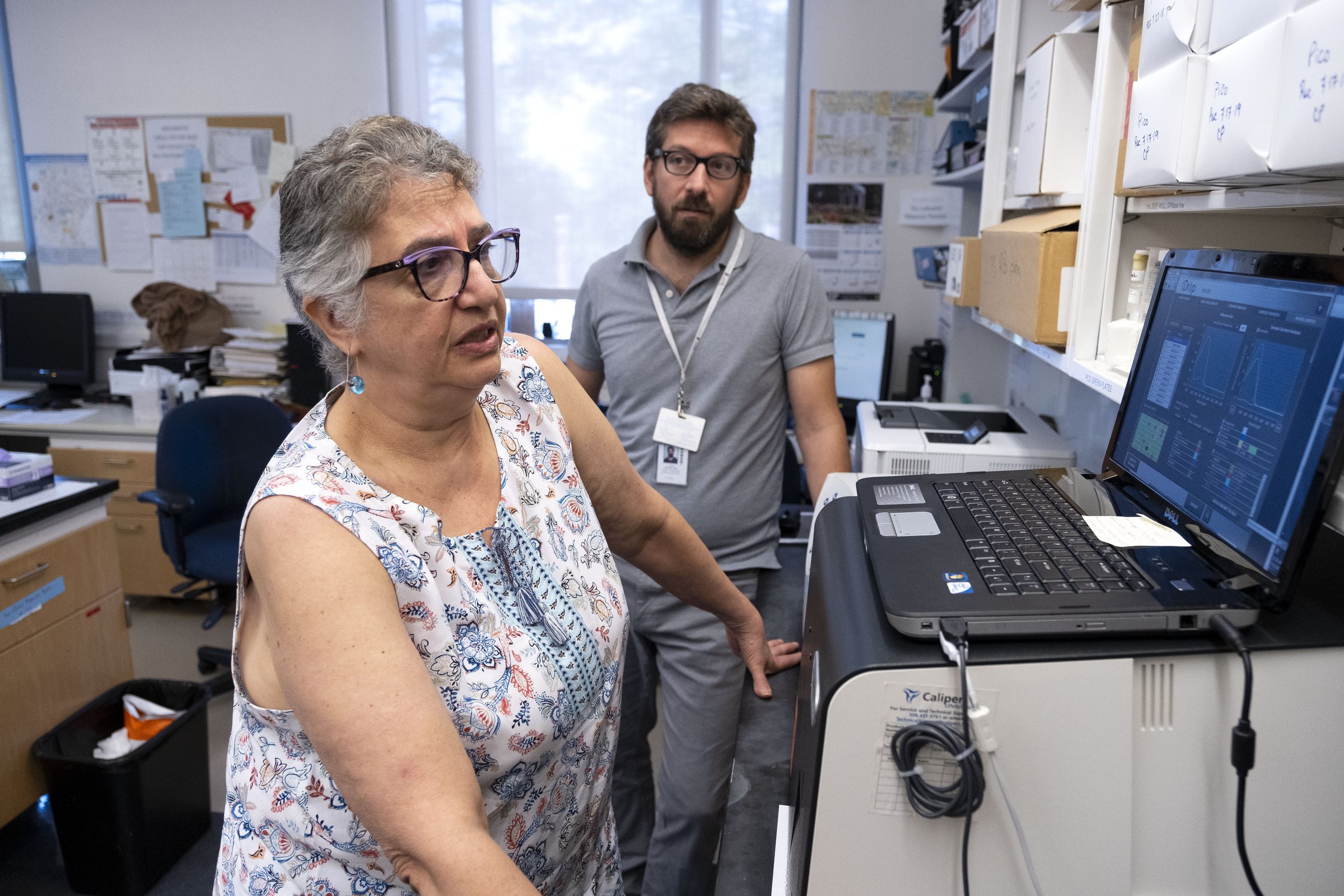
As a Ph.D. student, Assistant Professor Eric Riddell became interested in how animals respond to climate change. He analyzed how salamanders alter their energy use and lose water in response to changes in the environment.
In fall 2023, Riddell opened his lab in the UNC Department of Biology. His team uses animal tissues and computer modeling to better understand how animals adapt to a changing climate.
But Riddell needed a place to store those animal tissues. He became interested in the Renewable Energy Special Projects Committee’s (RESPC) Efficient Freezer Rebate Program (EFRP) because of how his research connects to climate change.
“I would like to minimize the carbon footprint of my lab,” said Riddell. “I feel like this program is an effective way to be involved in doing that.”
Riddell is one of two brand new UNC-Chapel Hill faculty members to receive a rebate on a highly efficient ultra-low temperature freezer (ULT) through the EFRP. Indriati Hood Pishchany, who joined the UNC Pediatric Division of Infectious Diseases last summer, also received a rebate, which will support her research on women’s health.
Freezing Lab Samples
ULT freezers keep lab samples at -80 °C. A typical ULT freezer uses as much energy as a single-family home. Through the EFRP, labs can choose from a list of highly efficient freezers, which consume as little as a third of the energy.
To date, RESPC has provided rebates for more than 80 ULT freezers, making the program a key component of Carolina’s $1.2 billion research effort. This year, labs in the UNC College of Arts & Sciences, UNC Gillings School of Global Public Health, UNC Eshelman School of Pharmacy and UNC School of Medicine benefitted from the program.
“The Efficient Freezer Rebate Program is a fantastic program that helps labs make the most energy efficient choice at every turn,” said Becca Segal, RESPC co-chair. “It is also one of RESPC’s most long-standing initiatives.”
Keeping samples safe

The UNC School of Medicine houses many biorepositories, which store human samples like tissue, blood and plasma. Researchers use the samples to understand diseases, develop new drugs and link environmental exposures to human health. For this work, reliable freezers are a must.
Susan Moist, director of clinical trial operations at UNC Center for Gastrointestinal Biology and Disease, applied for the EFRP. The Center aims to diagnose, treat and prevent GI conditions. Moist said that because the Center is supporting more projects, their current freezers are at capacity.
“The ability to store samples for research use is paramount in the success of our group and advancement of research,” said Moist. “The EFRP allows us to purchase equipment we otherwise would not be able to afford.”
Growing biorepositories are a theme at UNC-Chapel Hill.
For more than 40 years, the Center for Environmental Medicine, Asthma and Lung Biology (CEMALB) has studied asthma, COPD, cardiovascular disease and respiratory infections.
Professor Neil Alexis established the CEMALB biorepository in 2002. He currently maintains the resource, which houses more than 750,000 samples.
The other samples come from the Center’s six other labs, UNC-Chapel Hill collaborators, industry sponsors and external investigators. With a new energy-efficient freezer, they’ll be able to store specimens for future projects.
Sometimes ULT freezers come to the end of their life.
The UNC Biospecimen Processing Facility, led by Faculty Director Patricia Basta, has received multiple freezers through the EFRP program. This year, the need was clear.
“Our 20+ year old freezer had just died,” said Basta. “The freezer currently houses one third of the samples from the long-standing Carolina Head and Neck Cancer Study (CHANCE-2), which is ongoing and began in 2002.”
CHANCE-2 is the first study to examine tumors and note the differences in subpopulations of cells, in head and neck cancers caused by human papilloma virus (HPV), as well as tumors not caused by the virus. A new freezer means preservation of more than two decades of research.
Replacing aging freezers
Investing in a highly efficient freezer is great for lab sustainability, but it’s even better when two labs can figure out how to share a freezer. Nate Hathaway and Samantha Pattenden both have labs in the UNC Eshelman School of Pharmacy.
With one shared (and aging) freezer between the two of them, they managed to curate their samples to take up just two shelves each. They applied for a rebate to replace their 15-year-old freezer, which will also be shared.
“When we open our current freezer door the temperature drops substantially and we can’t get back to temperature for hours,” said Hathaway. “We use the freezer to hold sensitive protein and virus samples that cannot take the instability of the aging -80°C we currently use.”
On average, the typical lifespan of a ULT freezer is 15 years. Between the University’s large research operation and hospital, it’s not surprising many labs need new freezers urgently. The Matera and Linnstaedt Labs also expressed urgent needs for a new freezer, with the Linnstaedt Lab applying for emergency funding in last spring.
Around that same time last spring, RESPC allocated funds to support the EFRP for another five years, until spring 2028.
“It was an easy choice made with the full support of our student group,” said Segal. “Our group was very encouraged by positive reports from labs that received funding and the overall energy savings. We’re excited to continue using our funds to prioritize energy efficient freezers in the future.”
Apply for the EFRP
The winter application window for the EFRP opens every January and selected rebate recipients will be notified in March. During each funding window, a total of $35,000 will be available for Carolina labs. Each award is capped at $7,000 or 35% of the cost of the approved freezer model. Emergency applications for failed freezers can be submitted at any time.
Cindy Shea, sustainability director at Sustainable Carolina, serves as an ex officio member of RESPC. She encourages any lab at Carolina to think about transitioning to a highly efficient ULT freezer.
“The program fosters a culture of sustainability in science,” said Shea.
